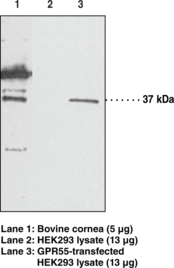Territorial Availability: Available through Bertin Technologies only in France
- Correlated keywords
- Product Overview:
GPR55 is an orphan G protein-coupled receptor.{53310} GPR55 is expressed in the brain, large dorsal root ganglion neurons, and many peripheral tissues.{53311,17584} Endogenous agonists for GPR55 include lysophosphatidylinositol (EC50 = 1.2 µM in a ?-arrestin-GFP biosensor assay) and the endocannabinoids anandamide (arachidonoyl ethanolamide; Item No. 90050) and 2-arachidonoyl glycerol (Item No. 62160; EC50s = 18.4 and 3.5 nM in GTP?S binding assays).{53310,53312} It is also activated by the cannabinoid ?9-tetrahydrocannabinol (?9-THC; EC50 = 8 nM in a GTP?S binding assay).{53310,17581} GPR55 is expressed in ? cells and pharmacological activation increases glucose-induced insulin release in wild-type mice and, to a lesser extent, in Gpr55 knockout mice.{53313} GPR55 expression is increased in the visceral adipose tissue of obese patients and, to a larger extent, in obese patients with type-2 diabetes.{53314} Activation of GPR55 increases the growth and invasiveness of cancer cells in vitro, and its expression in patient-derived tumors is positively correlated with a worse prognosis.{53313} GPR55 activation has also been associated with inhibition of osteoclast formation. Cayman’s GPR55 Polyclonal Antibody can be used for flow cytometry, immunofluorescence, and Western blot applications. The antibody recognizes GPR55 at 37 kDa from human and bovine samples. Post-translational modifications such as glycosylation may retard receptor electrophoretic migration such that the protein signal may be detected above 37 kDa.
Cayman Chemical’s mission is to help make research possible by supplying scientists worldwide with the basic research tools necessary for advancing human and animal health. Our utmost commitment to healthcare researchers is to offer the highest quality products with an affordable pricing policy.
Our scientists are experts in the synthesis, purification, and characterization of biochemicals ranging from small drug-like heterocycles to complex biolipids, fatty acids, and many others. We are also highly skilled in all aspects of assay and antibody development, protein expression, crystallization, and structure determination.
Over the past thirty years, Cayman developed a deep knowledge base in lipid biochemistry, including research involving the arachidonic acid cascade, inositol phosphates, and cannabinoids. This knowledge enabled the production of reagents of exceptional quality for cancer, oxidative injury, epigenetics, neuroscience, inflammation, metabolism, and many additional lines of research.
Our organic and analytical chemists specialize in the rapid development of manufacturing processes and analytical methods to carry out clinical and commercial GMP-API production. Pre-clinical drug discovery efforts are currently underway in the areas of bone restoration and repair, muscular dystrophy, oncology, and inflammation. A separate group of Ph.D.-level scientists are dedicated to offering Hit-to-Lead Discovery and Profiling Services for epigenetic targets. Our knowledgeable chemists can be contracted to perform complete sample analysis for analytes measured by the majority of our assays. We also offer a wide range of analytical services using LC-MS/MS, HPLC, GC, and many other techniques.
Accreditations
ISO/IEC 17025:2005
ISO Guide 34:2009
Cayman is a leader in the field of emerging drugs of abuse, providing high-purity Schedule I-V Controlled Substances to federally-licensed laboratories and qualified academic research institutions for forensic analyses. We are certified by ACLASS Accreditation Services with dual accreditation to ISO/IEC 17025:2005 and ISO Guide 34:2009.





